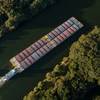Jotun, DNV GL: Making Coatings Digital
Seeking to optimize the delivery of its maritime coatings at port, Jotun said it is using DNV GL’s Veracity platform combining external and proprietary data to create an ecosystem where users can safely share data and link it to other quality assured datasets. In this case Jotun is using the Estimated Time of Arrival (ETA) dataset to ensure it has the right amount of product in the right place.
“Veracity is making paint digital. Jotun have recognized that even products that seem as analogue as paint can benefit from digital solutions and this is an example of how Veracity is not simply a platform for data but also a place for collaboration,” said Bjørn Tore Markussen, Managing Director of the Veracity platform unit in DNV GL.
Ships have for some time reported their positions through Automatic Identification System (AIS) transponders but a team from DNV GL have cleaned the data and then developed an algorithm that accurately predicts arrivals at ports. Jotun joined the Veracity pilot program to verify its benefit to the market and it became apparent that an early approximation for vessels future port visits could provide value to Jotun’s supply chain. A more comprehensive understanding of the movements of the global fleet allows Jotun to optimize their stock and delivery planning.
Jotun’s digitalization journey started more than 6 years ago with the development of the Hull Performance Solutions (HPS). In HPS, high-frequency sensor data from on-board vessels is used to track and guarantee the performance of the underwater hull coatings, protecting the hull from biofouling and increased friction. Following this successful IoT (Internet of Things) experience, Jotun strives continuously to identify areas where data delivers extra value for both the vessel owner or operator and Jotun. The ETA project with DNV GL is one such example where data and advanced analytics create benefits.
DNV GL is currently developing ETA Enhanced which will build on the current model that will more accurately predict the arrival of vessels by utilizing specific data about various vessels from the asset owners themselves.













